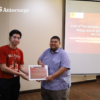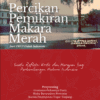After the national youth pledge in October 1928, nationalist movement grew stronger, especially among young intellectuals in Nusantara Archipelago (now modern Indonesia). The colonial ruler took the emergence of Indonesian nationalism as a serious threat. A year after that, in December 1929, to anticipate any uprising, the Dutch East Indies Government ordered the arrest of four prominent young nationalists while they attended the Indonesian youth convention in Yogyakarta. They were Sukarno, who later became the first President of Indonesia, Gatot Mangkupraja, Maskun Sumadireja, and Supriadinata, all were the founders of the Indonesian National Party (PNI).
The Trial of Sukarno
Following the arrest, Sukarno together with his colleagues were detained in Bandung, West Java, then set to be tried in Landraad (Court for native Indonesians). The news of Sukarno’s trial attracted public attention as major newspapers closely reported the case. In the trial, the Colonial Government assigned Mr R. Soemadisoerja as the prosecutor while Sukarno and his colleagues were defended by a group of lawyers, Mr Sartono, Mr Sastro Mulyono, Mr Suyudi, and Mr Idi Prawiradiputra (“Mr” stands for Meester in de Rechten or Master of Laws in English).
In the trial, Sukarno, along with Mangkupraja, Sumadireja, and Supriadinata, was indicted for committing crimes for propagating hatred and falsehoods to overthrow the legitimate government. They were charged under articles 169 bis and 153 bis of Wetboek van Strafrecht (now the Penal Code). Sukarno defended himself before a panel of judges presided by Mr R. Siegerbeek van Heukelom.
Indonesië Klaagt Aan!
It was on 2 December 1930 when Sukarno delivered his furious but well-reasoned defense oration titled “Indonesië klaagt aan!” or “Indonesia accuses!” in the Landraad courtroom of Bandung. A defense oration which was originally handwritten by Sukarno himself when he was detained for 8 months before his trial commenced.
In his defense oration, Sukarno condemned international political conditions and criticized colonialism, capitalism, and imperialism that destructed the Indonesian society. Sukarno, however, did not hide his desire to establish an independent state for the Indonesian people. He asserted in his oration that national freedom is the main condition for the reconstruction of the Indonesian society. Sukarno stressed that national freedom, which was the idea fought for by PNI, must become the aspiration of the entire Indonesian people in the first place. It was also in his defense oration where Sukarno introduced “Marhaenism”, his idea of nationalism that defended the Indonesian people against the oppression and extortion of capitalism, imperialism, and feudalism towards building a just and prosperous society free of oppression and extortion for both the nation and the people of mankind.
In constructing his arguments and justification of his conduct, Sukarno established himself as a well-educated and intelligent man by referring to several works of respected European statesmen and intellectuals such as Pieter Jelles Troelstra, Henry Nol Brailsford, Dr. Jan Steffen Bartstra. However, despite his sensible defense, on 22 December 1930, Sukarno was found guilty as charged and the panel of judges condemned him to four years at Sukamiskin Prison.
Relevance After 80 Years of Independence
Fifteen years after the Bandung trial, following Japanese capitulation to the allied forces that ended the Second World War in the Pacific, Sukarno and Mohammad Hatta, a former Indonesian student activist in the Netherlands, finally proclaimed Indonesia’s independence on 17 August 1945.
Now, eighty years have passed and Sukarno’s vision in “Indonesië klaagt aan!” where Indonesia stands as a free and sovereign nation has been realized. However, a question remains whether we as an independent nation have been able to build a just and prosperous society Sukarno once envisioned.
As long as extreme poverty, inequality, and injustice can be seen among Indonesians which stands in contrast to the true meaning of national freedom, we shall unite stronger to overcome the challenge as the nation’s current struggles are no longer battling a foreign occupation but to eradicate corruption, inequality, and environmental degradation. In this context, the spirit of Sukarno’s defense urges Indonesians to be courageous in standing against injustice and to remember that independence is not merely a historical milestone but a continuous effort to build an equitable and dignified society.
Thus, the legacy of Sukarno’s defense was not frozen in the past. His defense oration continues to challenge each generation to reflect on the meaning of freedom and to actively participate in shaping the nation’s future. As Sukarno once envisioned, true independence is achieved only when every Indonesian can enjoy their rights and contribute to the nation’s progress without fear or oppression. That ideal serves as a timeless reminder for achieving what remains undone, for the struggle toward true independence is far from over.
Back to Info From Us





